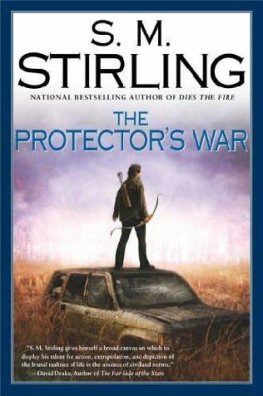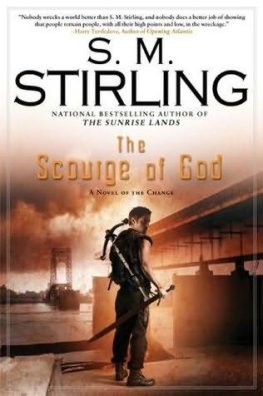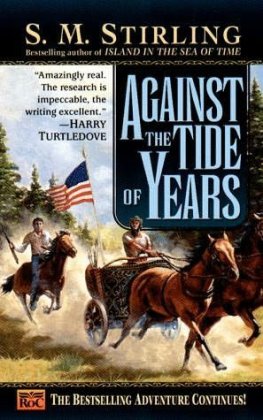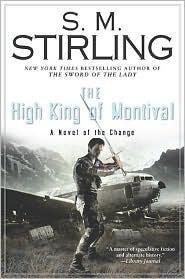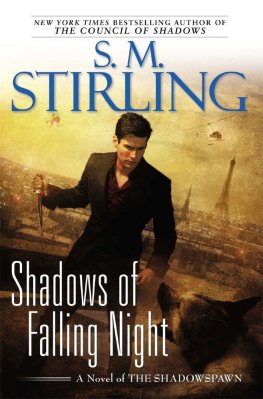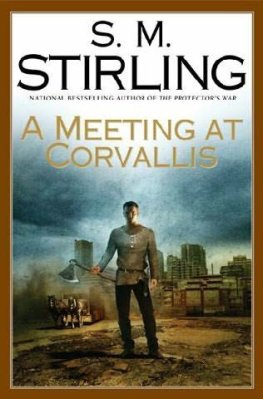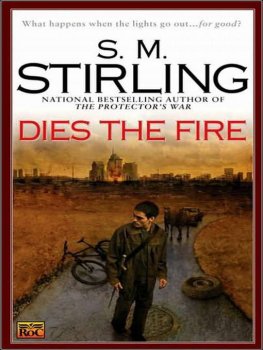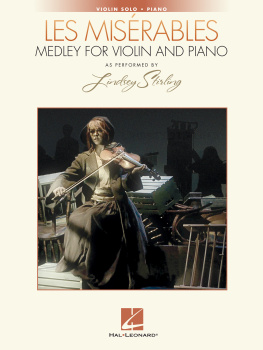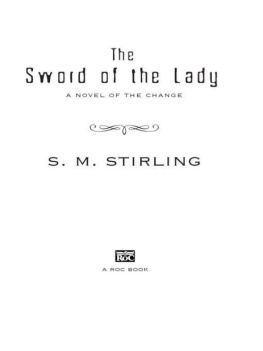S. Stirling - The Protectors war
Here you can read online S. Stirling - The Protectors war full text of the book (entire story) in english for free. Download pdf and epub, get meaning, cover and reviews about this ebook. genre: Science fiction. Description of the work, (preface) as well as reviews are available. Best literature library LitArk.com created for fans of good reading and offers a wide selection of genres:
Romance novel
Science fiction
Adventure
Detective
Science
History
Home and family
Prose
Art
Politics
Computer
Non-fiction
Religion
Business
Children
Humor
Choose a favorite category and find really read worthwhile books. Enjoy immersion in the world of imagination, feel the emotions of the characters or learn something new for yourself, make an fascinating discovery.
- Book:The Protectors war
- Author:
- Genre:
- Rating:4 / 5
- Favourites:Add to favourites
- Your mark:
- 80
- 1
- 2
- 3
- 4
- 5
The Protectors war: summary, description and annotation
We offer to read an annotation, description, summary or preface (depends on what the author of the book "The Protectors war" wrote himself). If you haven't found the necessary information about the book — write in the comments, we will try to find it.
The Protectors war — read online for free the complete book (whole text) full work
Below is the text of the book, divided by pages. System saving the place of the last page read, allows you to conveniently read the book "The Protectors war" online for free, without having to search again every time where you left off. Put a bookmark, and you can go to the page where you finished reading at any time.
Font size:
Interval:
Bookmark:
S. M. Stirling
The Protector's War
Chapter One
Woburn Abbey/Aspley Wood/Rasta Bob's Farm
Bedfordshire/Buckinghamshire, England August 12th, 2006 AD-Change Year Eight
I've been here before, John Hordle suddenly realized, his thumb moving over the leather that covered the grip of his bow.
The moon was up, and it glittered on the ruffled surface of the water to his left, where swans and ducks slept or swam lazily. But there was still little light under the three tall yews and the big oak; the night around him was still save for night birds, the whoo-whit of tawny owls and the screech of the barn type. Seven armed men lay grimly silent behind brush and waist-high grass, watching the great country house a quarter mile to the northeast. Candles and lantern lights flickered and blinked out behind the windows as the servants and garrison sought their beds. The pale limestone of it still glowed in the light of moon and stars.
When was that? Before the Change, of course, but when? In summer, I think.
Woburn Abbey was old; it began as a great Cistercian monastery, in the year when the first Plantagenet was crowned King of England. Henry VIII hung the last abbot from an oak tree on the monastery grounds when he broke with Rome and declared himself head of the Church, and granted the estate to a favorite of his named John Russell. The fortunes of the Russell family waxed and waned with those of the English aristocracy and England herself. In the palmy years of the eighteenth century the fifth duke rebuilt the country house in Palladian magnificence and surrounded it with a pleasance-deer park and gardens covering five square miles-very convenient with London only thirty miles to the south. In 1953 the eleventh duke had opened it to the paying public, complete with golf course, pub, guided tours and antique shop-and avoided the forced sales which so many of his peers suffered after the Second World War.
Came on a day-trip, I did, drove up the M1. After I enlisted, but before I did the SAS selection: August of 1996, ten years ago to the month. Me first leave: who was the girl? Blond all over, she was, I remember that for certain. And she giggled.
In England the Change had struck in the early hours of the morning on March 18, 1998: the owner's family and Woburn 's staff had only begun to realize what the failure of electricity and motors and explosives meant when the first spray of refugees from Milton Keynes and Luton arrived in the area two days later. The last duke's heir set up emergency quarters in the buildings and in tents in the great park, doing his best to organize supplies and sanitation. That ended when the last of the deer were eaten or escaped; by then most of the animals in the attached Safari Park had been released, before the keepers realized that even lion and timber wolves, tiger and rhino were edible when the other choice was death.
Shortly thereafter the hordes fleeing north from London met those from the midland cities moving south, and the great dying was well under way. A cannibal gang from the south side of Milton Keynes used the buildings as a headquarters for a time, roasting the meat of their catches in the fireplaces over blazes fed by the Regency furniture, rutting in the beds where Victoria and Albert had slept, and sitting beneath the Canalettos and Rembrandts to crack thighbones for the marrow with Venetian-glass paperweights. They turned on each other when prey grew scarce, and the last died of typhus on Christmas Day of 1998, shivering and comatose and alone.
Mary Sowley, that was her name. Bugger me blind if it wasn't ten years ago to the day. We drove through Safari Park and looked at the bloody lions and didn 't that get her motor going: She married that commuter in Essex, the one with fuzzy dice hanging from his rearview mirror. God alone knows where the poor bitch left her bones. Hope it was quick.
Bicycle-borne scouts from the Isle of Wight scoured Bedfordshire in the spring of 1999; the smaller island off the south coast of the greater had kept two hundred thousand alive in the wreckage of a world, but resettling the British mainland was urgent. Their primary concern was to see where a useful crop of volunteer wheat could be reaped from fields unharvested the previous year and find the tools to do it, but on instructions from new-crowned King Charles III they made a stop at Woburn and a cursory attempt to board up windows and close doors as well, to protect the pictures and porcelain within. By the summer of Change Year Eight the estate was on the northeastern-most fringe of the recolonized zone, a royal garrison post in the commandery of Whipsnade.
There's some who'd say it's stupid to think about girls just before the hitting starts. Sam Aylward had, for example; but then Samkin was the sort who polished bullet casings in his spare time to cut down on the chance of a jam. I wonder where old Sam ended up? He was abroad somewhere on the day of the Change.
It was now nearly a decade later, and even past midnight John Hordle was sweating beneath his chain-mail shirt and underpadding. Insects buzzed and burrowed and bit amid the mysterious rustles and clicks of any forest at night- though these days that could include the movements of large carnivores with intent to harm.
Men are more dangerous, he thought whimsically. They'll go for your throat when they aren't hungry.
He could smell the intense yeasty smell of the dirt scuffed up beneath him as he crawled into position where grass and thistles stood tall. Training could let you move soundlessly; it didn't make you any lighter, and John Hordle had reached seven inches over six feet when he turned twenty in the year of the Change. He'd never been fat, but the only time he'd been under two hundred fifty pounds was that winter and spring, when the rations on the Isle of Wight had gotten just short of starvation amid hard labor and wet chill.
A soundless alert went among the men of his squad as boots tramped through the night, tense expectancy as a pair of sentries made their rounds between the raiding party and its target, tramping along the low ridge between the water and the house.
Vicious SIDs, he thought, motionless but acutely conscious of the speeding of the blood beating in his ears. Or Varangians, as Sir Nigel prefers. More dignified, I suppose.
The armor of the big men who paced by was enameled a dull matte green; they wore steel breast- and backplates, mail sleeves and leggings, and rounded sallet helmets with flares to protect the neck. That color didn't reflect much, but moonlight still glinted on steel-the honed edges of broad ax blades. Those were long-hafted weapons meant to be swung two-handed; the trademark of their unit.
"Hun er sviska!" one said, murmuring and shaping the air with his free hand. Which meant, roughly: What a stunner!
Special Icelandic Detachment, right enough, Hordle thought.
He'd picked up a little of the language-mostly in bed and from girls-since the islander refugee immigrants poured in during the second and third Change Years.
Same as King Charles, when he threw over Camilla and took up with Hallgerda. Mind, I don't blame him. Those legs!
The other guard chuckled and nodded: "Hun heldur afram og afram. "That translated as: She goes on and on!
His left hand closed slowly on the grip of his longbow; there was an arrow on the string and four more were laid out in front of him, points and fletchings blackened with soot. One of the SIDs flipped his ax down from his shoulder and began a casual practice routine with it, spinning it in his hands and switching from right-hand leading to left on the fly-far from easy, and risky with an unshielded edge. It made an unpleasant fweeept sound as it cut the air in blurring arcs and circles.
Go on, Njal, Hordle thought, willing them to notice nothing. Back to your nice cozy room and take a nap:
Font size:
Interval:
Bookmark:
Similar books «The Protectors war»
Look at similar books to The Protectors war. We have selected literature similar in name and meaning in the hope of providing readers with more options to find new, interesting, not yet read works.
Discussion, reviews of the book The Protectors war and just readers' own opinions. Leave your comments, write what you think about the work, its meaning or the main characters. Specify what exactly you liked and what you didn't like, and why you think so.

